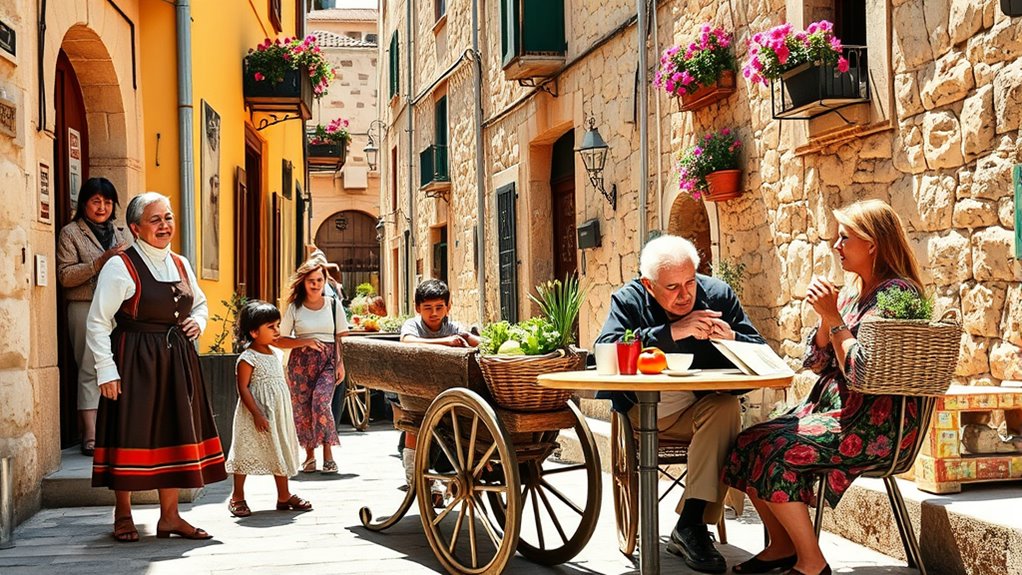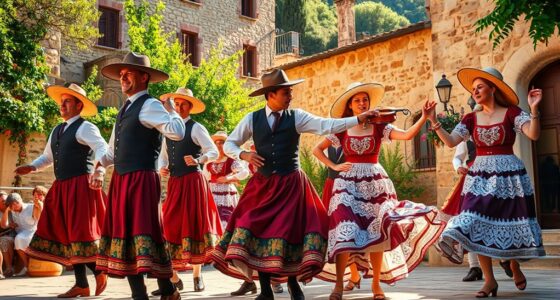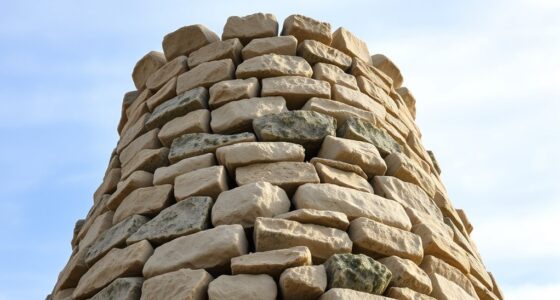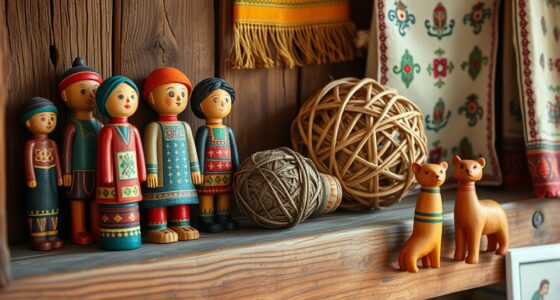In Ittiri, you’ll find daily life driven by outdoor chores, community events, and rich cultural traditions. Locals start early with farming and livestock care, then relax during siesta, before gathering in local bars for socializing. Festivals, such as the Ittiri Folk Festival, celebrate their heritage through music and dance. With outdoor activities like hiking and fishing, plus strong family bonds, there’s much to explore about their vibrant community if you keep going.
Key Takeaways
- Locals start their days with outdoor chores like gardening and livestock care, integrating physical activity into daily routines.
- Evenings often involve socializing at local bars or pizzerias, strengthening community bonds and cultural traditions.
- Traditional crafts such as weaving and embroidery are passed down, reflecting Sardinian heritage and family practices.
- Community festivals feature music, dances, and processions, showcasing local customs and fostering cultural pride.
- Outdoor activities like hiking and fishing are popular, offering scenic experiences and social gatherings in natural settings.
Top picks for "daily life ittiri"
Open Amazon search results for this keyword.
As an affiliate, we earn on qualifying purchases.
Gathering Daily Routines From Ittiri Residents
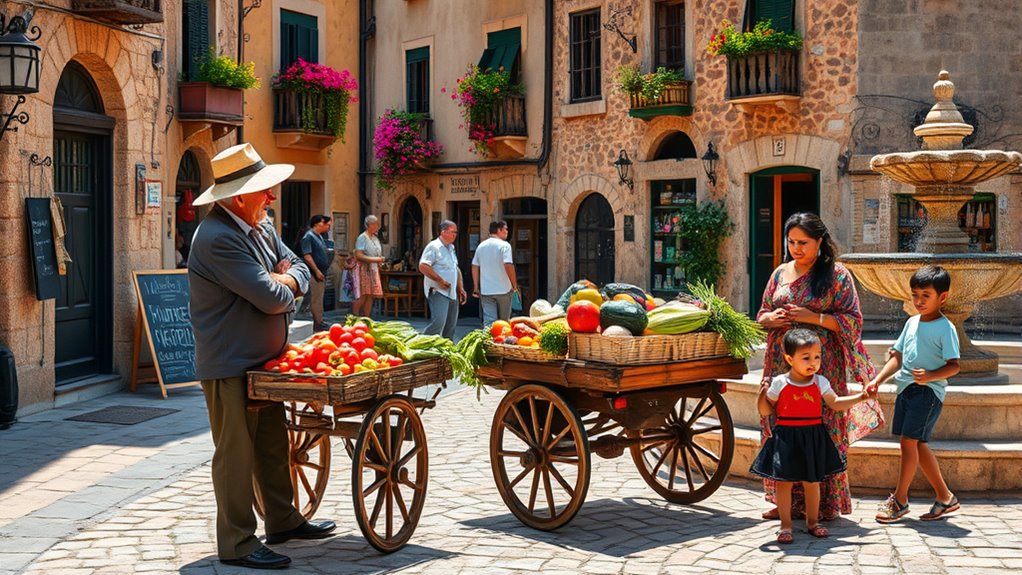
In Ittiri, residents follow a set daily routine grounded in natural rhythms and manual labor. You wake up early at dawn to make the most of cooler morning hours, tending to your vegetables and livestock. Walking and hiking through the mountainous terrain are common, serving both transportation and recreation. Your day involves physically demanding tasks like gardening, chopping wood, and caring for animals, which naturally keep you fit and healthy. No formal exercise is needed because manual labor and walking fulfill your fitness needs effortlessly. You pause for a mid-day siesta to escape the heat, then resume chores in the afternoon. Evenings are quiet, with many heading to local bars or pizzerias to unwind. Your routine is predictable, reinforcing a simple, healthy lifestyle rooted in community and nature. Local religious sites often serve as gathering places for community events and spiritual reflection, further strengthening social bonds. Additionally, the Pinball Machines craze has found a niche among the youth, offering entertainment during leisure hours and fostering social interactions.
Insights Into Local Family Traditions and Activities
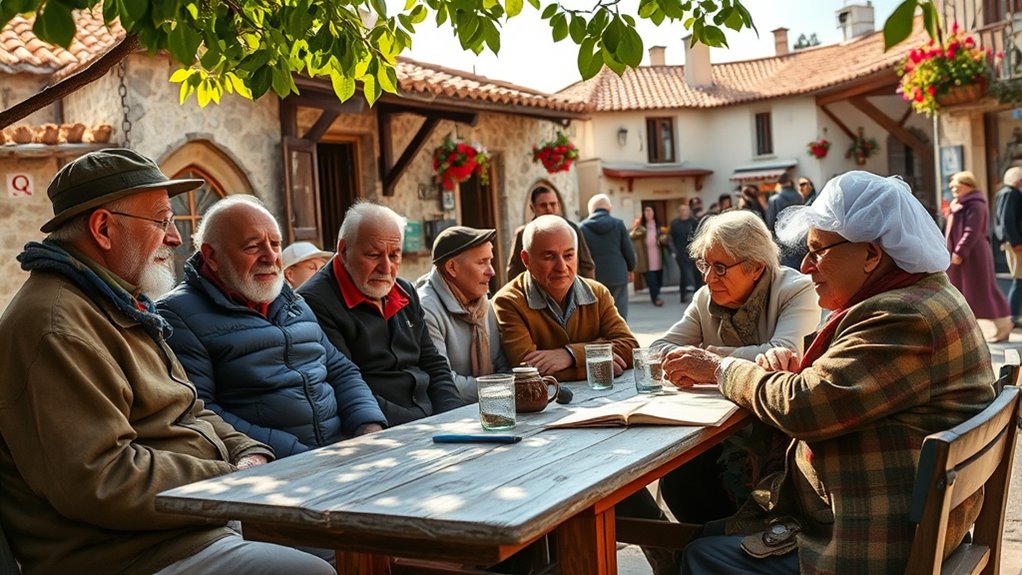
Family traditions and activities in Ittiri are deeply rooted in its cultural history and community bonds. You’ll notice that during family celebrations, women wear elaborate gala dresses decorated with jewels, embroidery, and silver or gold buttons—symbols of social status. Religious festivals, especially on Sundays and holidays, bring families together for processions, music, dances, and communal meals that reinforce shared values. Textile arts play a essential role, with families passing down weaving skills and creating household items like blankets and carpets that symbolize identity. Metalwork and jewelry, including filigree rings and buttons, are crafted to bring prosperity and protection. These traditions preserve history, strengthen family ties, and celebrate Sardinian heritage through food, crafts, and collective rituals. In particular, traditional dress like the ornate Ittiri Women’s Gala Dress exemplifies local craftsmanship and is often showcased during these festive occasions to honor cultural heritage. Additionally, the use of textile techniques such as embroidery and weaving highlights the importance of preserving traditional crafts for future generations.
Perspectives on Employment and Economic Life
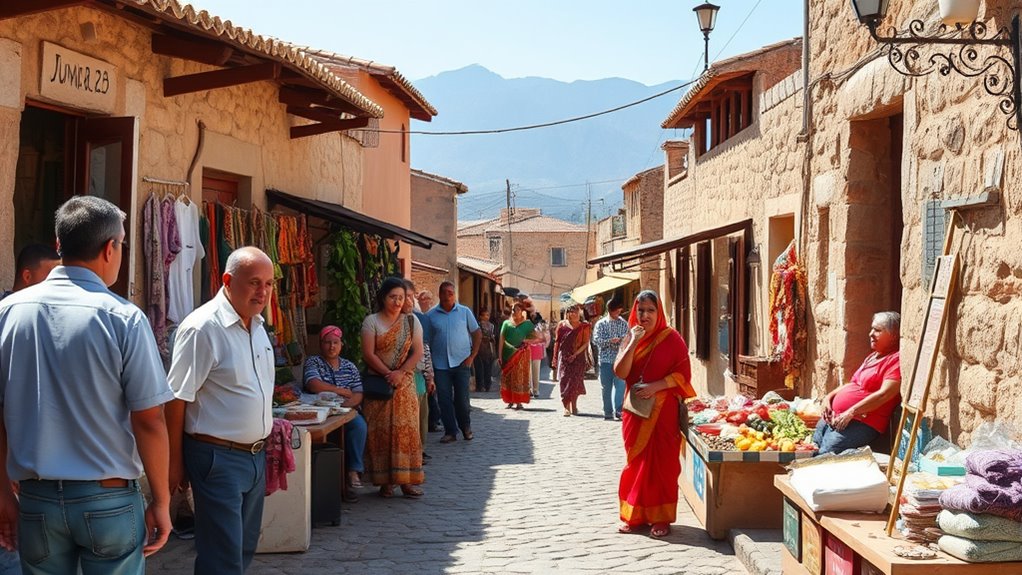
You’ll notice that local job opportunities in Ittiri are expanding, especially in sectors like sales, logistics, and green tech. Agriculture still plays a role, but many small businesses face challenges from competition and changing market needs. Understanding these economic shifts helps you see how residents adapt and seek new ways to sustain their livelihoods. Additionally, some residents are exploring alternative economic activities to diversify income sources and adapt to evolving market conditions.
Local Job Opportunities
Are job opportunities in Ittiri and the surrounding area changing rapidly? Not exactly, but challenges persist. Youth employment remains tough, with rates dropping sharply—down to 12.8% for ages 15–24 in 2024. Many young workers face precarious contracts, with 90.1% in unstable jobs. Female employment is also declining, widening gender gaps, and part-time roles dominate for women. Youth unemployment has significantly increased, reflecting broader regional trends. Here’s what’s available:
- Jobs in goods production, services, sales, logistics, and transport
- Opportunities for shopkeepers, restaurant staff, drivers, and cleaners
- Around 20,000 positions mainly in catering and sales sectors
- Demand for vocational skills, with some preference for higher education depending on the role
While opportunities exist, the job market remains competitive and evolving.
Agriculture’s Role Today
While job opportunities in Ittiri are mainly centered around retail, services, and logistics, agriculture remains a key part of the local economy and daily life. Nearly half of Sardinia’s land is used for farming, and rural communities rely heavily on pastoral practices like sheep, goats, and cattle breeding. Agriculture provides essential employment, especially for families in the countryside, although productivity limits growth. It also supports sectors such as food processing and fisheries, boosting local resilience. Wetland restoration projects enhance biodiversity and water management, offering ecological and economic benefits worth millions over time. Wetland restoration projects contribute to improved water quality and flood control, further supporting sustainable agricultural practices. However, water scarcity and poor soil quality challenge modernization efforts. Decluttering efforts in agricultural management and resource allocation can help optimize land use and productivity. Despite these hurdles, agriculture continues to sustain livelihoods and contribute considerably to Ittiri’s rural identity and economic stability.
Small Business Challenges
Small businesses in Ittiri face numerous challenges that impact their growth and sustainability. You might notice limited access to credit, making it hard to expand or diversify. The local market’s small size and lower purchasing power restrict potential profits, while competition from bigger firms and imported goods puts pressure on prices. Workforce issues are common, especially with skills shortages, youth unemployment, and seasonal employment fluctuations affecting consistent staffing. Infrastructure constraints, like poor internet and transportation, further hinder business operations and digital outreach. Additionally, demographic decline reduces consumer demand, making it tough to maintain steady sales. Despite efforts to support local entrepreneurship, many small businesses struggle to scale and adapt, facing ongoing hurdles in a fragile economic environment. According to recent studies, limited access to credit remains a significant obstacle for small business development in Ittiri. Moreover, adopting modern exfoliation techniques like glycolic acid treatments could help local businesses in the beauty and skincare sector differentiate their offerings and attract more customers.
Experiences With Education and Youth Engagement
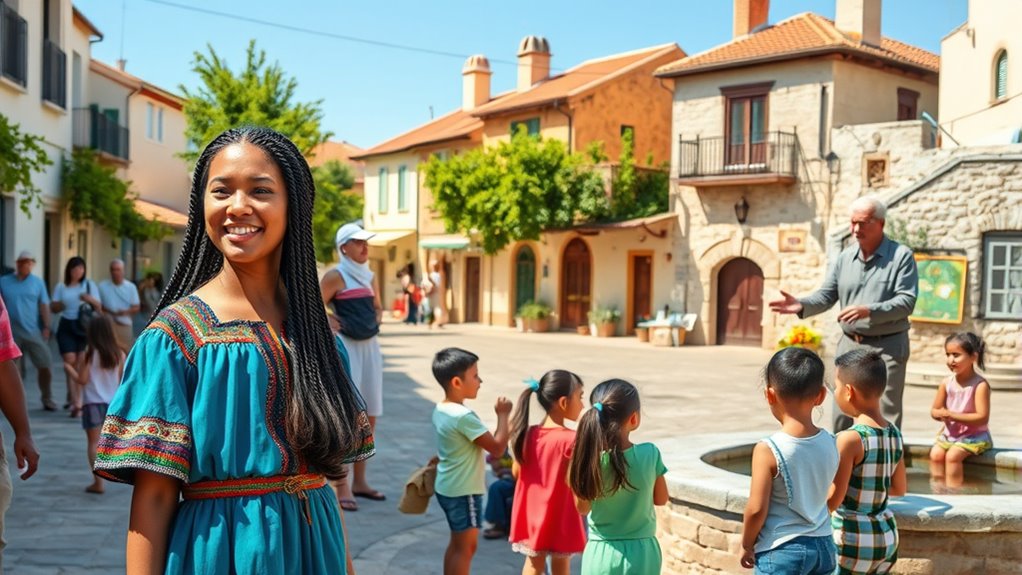
In Ittiri, young people experience education within a structured system that emphasizes both academic achievement and opportunities for engagement beyond the classroom. You attend school from ages 6 to 16, with the first five years in primary school, followed by three years of lower secondary education. After that, you can choose between upper secondary or vocational tracks, both offering pathways to higher education or direct employment. While enrollment rates are high, regional disparities affect educational quality, especially between northern and southern Italy. You might find the curriculum challenging, with performance in reading and science below the OECD average. Despite these challenges, more young people are pursuing tertiary education, and efforts are underway to improve vocational options, giving you diverse pathways for your future. The enrollment rate for primary education in Italy has remained consistently high, averaging over 99% for many years. Additionally, ongoing educational reforms aim to address regional disparities and enhance the quality of education across the country.
Healthcare Access and Wellness Practices in the Community
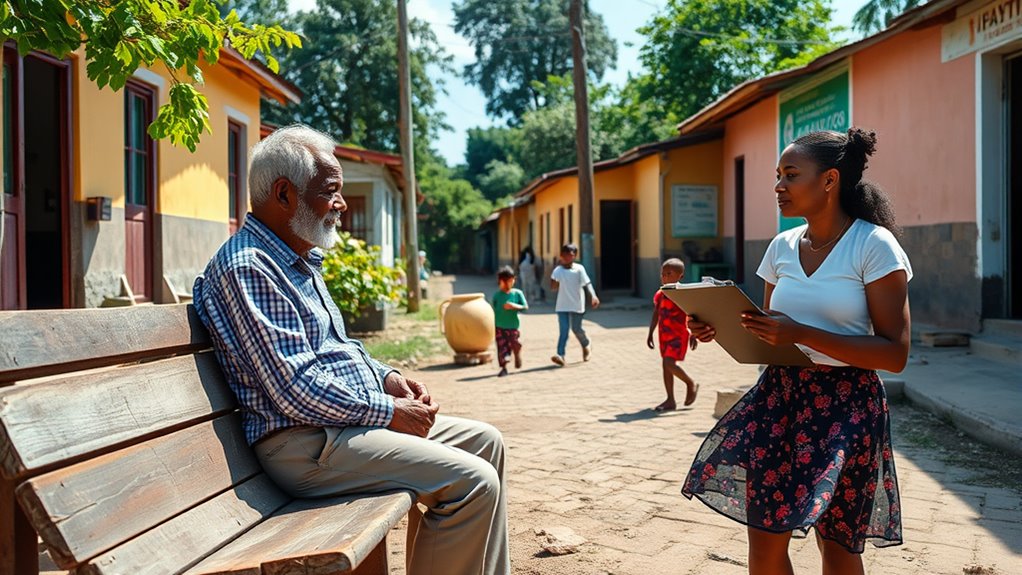
You notice that Ittiri’s local healthcare facilities endeavor to serve the community’s needs, but geographic and economic challenges can limit access. Traditional wellness practices, rooted in local culture, often complement formal healthcare, especially for the elderly. Exploring how these facilities and practices work together reveals much about daily life and health in Ittiri. Additionally, community members sometimes utilize preventive healthcare tools to maintain wellness and avoid more serious health issues.
Local Healthcare Facilities
Healthcare access in Ittiri faces significant challenges, despite the community’s strong advocacy for better services. The main facility, Alivesi Hospital, is crucial but has experienced setbacks, like the temporary closure of its long-term care ward since summer 2021. Community protests and occupations highlight the urgency to reopen these services, yet delays persist. You’ll notice:
- Waiting times are long, delaying diagnoses and treatments
- Shortage of nurses (6,000 island-wide) affects quality of care
- Regional health authorities often miss reopening deadlines
- Healthcare workers face low salaries, leading to staff shortages
Despite these hurdles, locals actively rally to defend their healthcare resources. The community’s efforts keep pressure on authorities for necessary improvements, but ongoing infrastructure and staffing issues continue to impact healthcare access daily. Regional healthcare management issues have contributed to delays in service restoration and foster community frustration. Additionally, healthcare staffing shortages are exacerbating these ongoing problems, making it difficult to meet community needs.
Traditional Wellness Practices
Traditional wellness practices remain a crucial part of Sardinian culture, blending ancient rituals with modern routines to promote overall well-being. You might participate in ‘Su Purtidu,’ a ritual that uses aromatic herbs for purification and spiritual cleansing, aiming to restore balance and dispel negative energy. Herbal remedies derived from local plants still play a vital role, emphasizing holistic healing that addresses body, mind, and spirit. Sardinians also embrace energy healing, yoga, meditation, and therapies like hydrotherapy and thalassotherapy using mineral-rich waters. Thermal baths, often set in natural surroundings, provide relaxation and therapeutic benefits, attracting both locals and visitors. Many integrate these practices into personalized wellness programs featuring local herbs, sea views, and nature-based activities to nurture health and harmony with nature. Additionally, the importance of family influences can be seen in how these traditional practices are passed down and adapted through generations, reinforcing community bonds and cultural identity.
Celebrating Festivals and Cultural Events
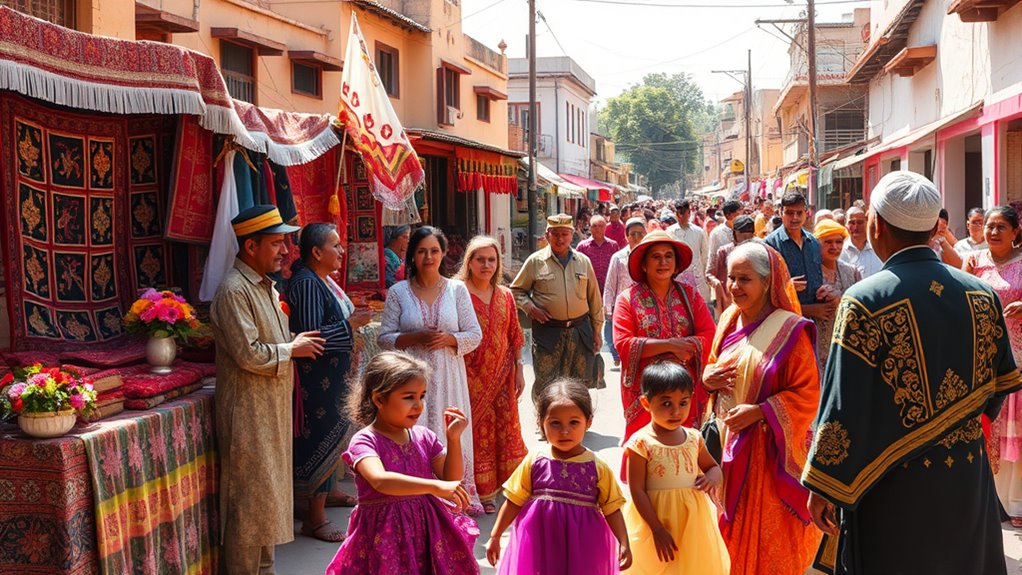
Celebrating festivals and cultural events in Ittiri offers a vibrant showcase of Sardinian heritage and global traditions. During these lively occasions, you’ll experience colorful costumes, lively music, and community dancing that bring everyone together. The Ittiri Folk Festival, held in mid to late July, draws folk groups from around the world, featuring performances, exhibitions, and traditional cooking demonstrations. You can explore:
- International dance and music performances
- Historical reenactments like “La Pasionaria” and Sant’Arrasa celebrations
- Folk art and craft exhibitions showcasing Sardinian skills
- Tasting local cuisine at traditional cooking demos
These events boost local pride, attract tourists, and support artisans, creating a festive atmosphere that celebrates both ancient customs and contemporary community life.
Leisure and Outdoor Activities Valued by Ittiri Locals
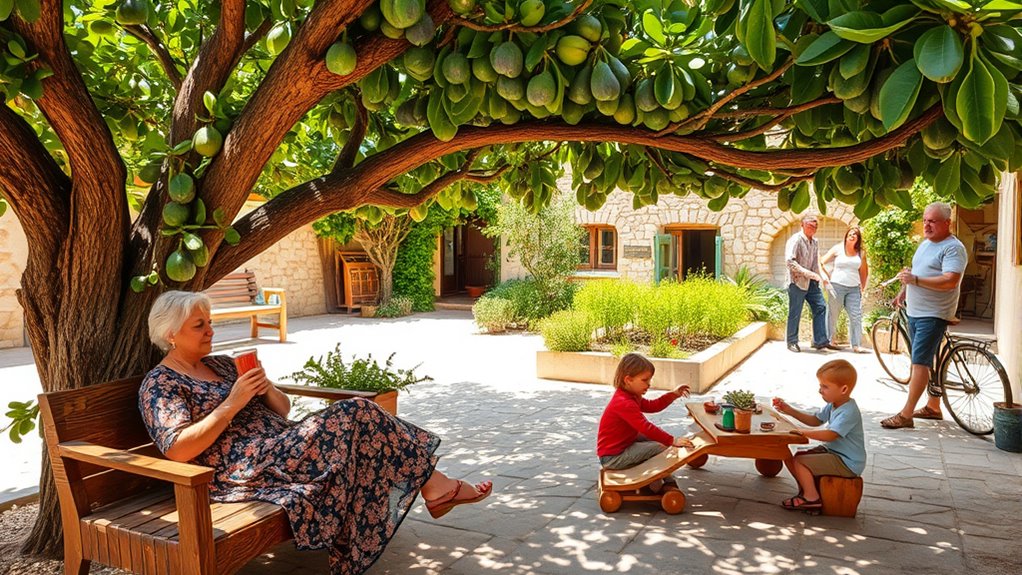
Ittiri locals greatly value outdoor activities that allow them to enjoy the region’s natural beauty and stay active. Hiking at Monte Torru offers scenic trails with striking rock formations and historic sites, perfect for exploration. The surrounding area features peaks, valleys, and lakes like Bidighinzu, Cuga, and Temo, providing diverse landscapes for outdoor fun. Be prepared for muddy conditions during rainy seasons, and consider guided hikes to ensure safety and respect for nature. Cycling is also popular, with routes suited for all skill levels, including mountain biking and road cycling. Water activities like fishing and boating happen at lakes during warmer months, while informal gatherings in open spaces strengthen community bonds. These outdoor pursuits reflect Ittiri’s love for nature and active living. According to regional outdoor activity recommendations, engaging in these pursuits can also promote eco-tourism and sustainable tourism practices among local residents and visitors alike.
Frequently Asked Questions
How Has Migration Affected Ittiri’S Community Dynamics?
Migration has crucially shaped Ittiri’s community dynamics by causing a decline in population and shifting its social fabric. You might notice fewer young people and a growing elderly population, which strains social services and alters local traditions. As residents leave more often than they arrive, the community faces challenges in maintaining economic vitality and cultural cohesion, requiring efforts to engage remaining residents and adapt to these demographic changes.
What Are the Main Challenges Facing Local Youth Today?
Imagine you’re living in Ittiri, where youth face tough challenges. You struggle with high unemployment, especially since seasonal tourism offers limited jobs. Education gaps and lack of modern skills hold you back from better opportunities. Social norms and environmental concerns also shape your choices, sometimes making you feel isolated. You wish for more support, innovation, and sustainable paths, but the current landscape leaves many young people feeling stuck and enthusiastic for change.
How Do Residents Preserve Traditional Crafts and Customs?
You can preserve traditional crafts and customs by actively participating in local festivals and workshops that celebrate heritage. Supporting artisans and wearing traditional clothing helps keep these practices alive. Passing down skills like embroidery, stone carving, and basket weaving to younger generations ensures they’re not lost. Engaging with community events and encouraging pride in your culture motivates others to maintain Ittiri’s rich artistic traditions for future generations.
What Role Does Local Cuisine Play in Daily Life?
Imagine a tapestry woven with flavors that bind you—local cuisine in Ittiri is that thread. It shapes your daily life by filling your table with fresh, regional ingredients, supporting local farmers, and keeping traditions alive. You share meals with family and friends, passing down recipes that carry history and love. This vibrant culinary culture isn’t just sustenance; it’s the heartbeat of your community, connecting past and present in every bite.
How Has Technology Changed Communication Within Ittiri?
You see how technology has transformed communication in Ittiri by making it faster and more accessible. You probably use social media, messaging apps, and email daily, replacing traditional calls and face-to-face chats. Local businesses now reach wider audiences online, and community events are organized through digital platforms. Even in rural areas, high-speed internet helps everyone stay connected, making social and administrative interactions more efficient and inclusive.
Conclusion
Just like a vibrant tapestry woven with daily moments, Ittiri’s life reflects a community’s heartbeat—rich in tradition, resilience, and joy. As you’ve seen through their stories, their routines echo the spirit of a land that’s both rooted in history and alive with hope. Remember, in every corner of Ittiri, you find echoes of a collective soul, reminding us that even in simplicity, there’s profound beauty—like a timeless song that never fades.
